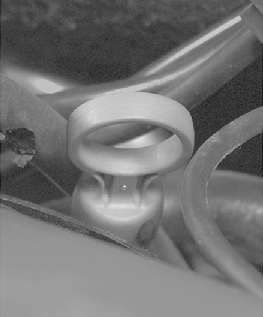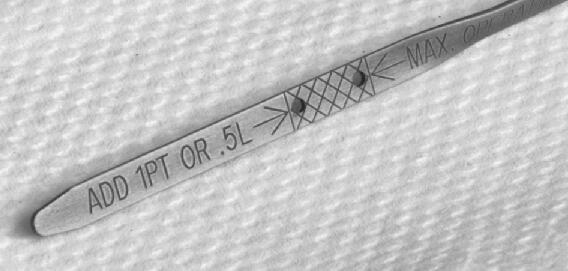When to Check and Change
A good time to check your automatic transaxle fluid level is when the engine oil is changed.
Change both the fluid and filter every 50,000 miles (83 000 km) if the vehicle is mainly driven under one or more of these conditions:
| • | In heavy city traffic where the outside temperature regularly reaches 90°F (32°C) or higher. |
| • | In hilly or mountainous terrain. |
| • | When doing frequent trailer towing. |
| • | Uses such as found in taxi, police or delivery service. |
If you do not use your vehicle under any of these conditions, change the fluid and filter at 100,000 miles (166 000 km).
How to Check
Because this operation can be a little difficult, you may choose to have this done at a GM dealer.
If you do it yourself, be sure to follow all the instructions here, or you could get a false reading on the dipstick.
Notice: Too much or too little fluid can damage the transaxle. Too much can mean that some of the fluid could come out and fall on hot engine or exhaust system parts, starting a fire. Too little fluid could cause the transaxle to overheat. Be sure to get an accurate reading if you check the transaxle fluid.
Wait at least 30 minutes before checking the transaxle fluid level if you have been driving:
| • | When outside temperatures are above 90°F (32°C). |
| • | At high speed for quite a while. |
| • | In heavy traffic -- especially in hot weather. |
| • | While pulling a trailer. |
To get the right reading, the fluid should be at normal operating temperature, which is 180°F to 200°F (82°C to 93°C).
Get the vehicle warmed up by driving about 15 miles (24 km) when outside temperatures are above 50°F (10°C). If it is colder than 50°F (10°C), you may have to drive longer.
Checking the Fluid Level
Prepare your vehicle as follows:
| • | Park your vehicle on a level place. Keep the engine running. |
| • | With the parking brake applied, place the shift lever in PARK (P). |
| • | With your foot on the brake pedal, move the shift lever through each gear range, pausing for about three seconds in each range. Then, position the shift lever in PARK (P). |
| • | Let the engine run at idle for three to five minutes. |
Then, without shutting off the engine, follow these steps:

The transaxle fluid dipstick top is a round, red loop and is located next to the brake master cylinder reservoir behind the engine block. See Engine Compartment Overview for more information on location.
- Pull out the dipstick and wipe it with a clean rag or paper towel.
- Push it back in all the way, wait three seconds and then pull it back out again.
- Check both sides of the dipstick, and read the lower level. The fluid level must be in the cross-hatched area.
- If the fluid level is in the acceptable range, push the dipstick back in all the way.

How to Add Fluid
Refer to the Maintenance Schedule to determine what kind of transaxle fluid to use. See Part D: Recommended Fluids and Lubricants .
If the fluid level is low, add only enough of the proper fluid to bring the level into the cross-hatched area on the dipstick.
- Pull out the dipstick.
- Using a long-neck funnel, add enough fluid at the dipstick hole to bring it to the proper level.
- After adding fluid, recheck the fluid level as described under "How to Check," earlier in this section.
- When the correct fluid level is obtained, push the dipstick back in all the way.
It does not take much fluid, generally less than one pint (0.5 L). Do not overfill.
Notice: Use of automatic transaxle fluid labeled other than DEXRON®-III, Approved for the H-Specification, may damage your vehicle, and the damages may not be covered by your warranty. Always use automatic transaxle fluid labeled DEXRON®-III, Approved for the H-Specification.
